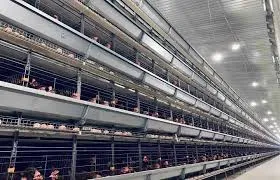Innovative Technologies in Feed Processing Equipment for Enhanced Agricultural Efficiency and Productivity
សីហា . 15, 2024 19:24 Back to list
Innovative Technologies in Feed Processing Equipment for Enhanced Agricultural Efficiency and Productivity
The Importance of Feed Processing Machines in Modern Agriculture
In the realm of modern agriculture, feed processing machines play a pivotal role in enhancing the efficiency and effectiveness of livestock production. As the global demand for animal products continues to rise, the need for high-quality, nutritious feed becomes increasingly critical. Feed processing machines help bridge this gap by transforming raw agricultural materials into high-quality animal feed, thereby contributing to better livestock health and increased productivity.
Feed processing involves several stages, including grinding, mixing, pelleting, and granulating. Each of these processes requires specific machines designed to optimize efficiency and improve feed quality. For instance, grinders are essential for breaking down larger raw materials, making them easier to mix and process. A well-designed grinder ensures uniform particle size, which is crucial for animal digestion and nutrient absorption.
Mixing machines are another vital component of feed processing. They combine various ingredients, including grains, vitamins, minerals, and supplements, to create a balanced diet for livestock. Homogeneous mixing is essential to ensure that every animal receives the required nutrients in every bite. Technologies like horizontal and vertical mixers have been developed to cater to different production scales and feed formulations, allowing farmers to customize feeds according to the specific needs of their animals.
Pelleting is a significant advancement in feed processing that offers numerous benefits. By compressing feed into pellet form, the nutritional density is enhanced, and feed wastage is reduced. Pelleted feed is easier for animals to consume and digest, leading to improved feed conversion rates and overall health. Pellet mills, which use heat and pressure to create these pellets, are essential machines in livestock feed production. They can also produce different pellet sizes and shapes, catering to various livestock species, from poultry to ruminants.
feed processing machine

Moreover, feed processing machines also aid in the preservation of feed quality. Many advanced systems incorporate conditioning technologies that improve the shelf life of animal feeds by preventing spoilage and maintaining nutrient content. These machines allow for the application of steam and moisture during processing, ensuring that the feed retains its essential nutrients and remains palatable for longer periods.
The integration of automation and technology in feed processing is a game-changer for farmers. Modern feed processing machines often come equipped with advanced monitoring systems and programmable controls, allowing for precise adjustments in formulation and processing. This level of automation not only streamlines production but also minimizes labor costs and human error, leading to more consistent and reliable feed quality.
Additionally, the environmental impact of livestock farming has garnered increasing attention in recent years. Feed processing machines can help reduce this impact by optimizing feed use and minimizing waste. Efficient feed formulation leads to better utilization of feed resources, which in turn can decrease greenhouse gas emissions associated with livestock production. Hence, investing in advanced feed processing technology not only benefits farmers economically but also aligns with sustainable agricultural practices.
In conclusion, feed processing machines are indispensable in modern agricultural practices. They enhance feed quality, improve livestock health, and promote efficient production processes. As the industry continues to evolve, these machines will play an even more significant role in meeting the growing global demand for animal products, while simultaneously supporting sustainable farming practices. Investing in cutting-edge feed processing technology is not just a strategic choice for farmers; it is essential for the future of agriculture.
-
High Performance Exhaust Fan – Efficient Ventilation Solutions for Home
NewsJun.10,2025
-
High-Quality Gestation Pen for Sows Durable Mobile Pig Pen & Simple Pig Pen Solutions
NewsJun.10,2025
-
High Quality Rabbit Cage Double Tier Designs & Welded Wire Mesh Supplier
NewsJun.10,2025
-
Floating Fish Feed Machine - High Efficiency Floating Fish Feed Extruder for Small Scale Production
NewsJun.10,2025
-
Premium Poultry Housing Solutions Mobile & Commercial Free Range Options
NewsJun.10,2025
-
Industrial FRP Fans Corrosion-Resistant Blades & Centrifugal Systems
NewsJun.09,2025






